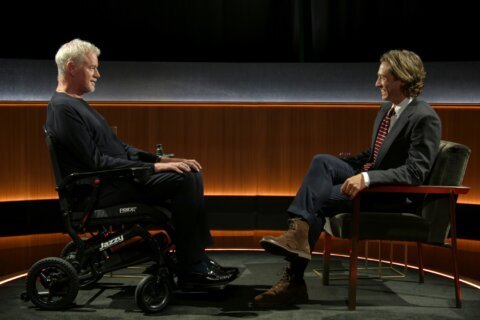Listen to our full conversation on my podcast “Beyond the Fame.”
Vertical Horizon was formed as a college band at Georgetown University back in 1991.
Thirty years later, the alternative rockers join Train at Wolf Trap on Aug. 19 at 8 p.m.
“It’ll be nice to be back at the old stomping grounds,” Frontman Matt Scannell told WTOP.
Born in 1970, Scannell grew up in Worcester, Massachusetts before enrolling at Georgetown.
“I was prepping for Plan B, to be honest with you, major in psychology and I had a minor in English,” Scannell said. “I studied some music history … Both Keith and I gave ourselves a year after we graduated to give the music thing a try and we were frankly expecting it to fail miserably, then we would go on to Plan B, but that never happened, fortunately.”
He still remembers the moment he met guitarist Keith Kane at a college party.
“A circle of people gathered around who knew how to play guitar,” Scannell said. “Keith played a song and I absolutely loved his voice and the spirit with which he played, then the guitar made its way around the circle and I played … my version of [Michael Hedges’] version of ‘All Along the Watchtower.’ It was fun. Right after that, Keith said, ‘Hey, do you want to jam sometime?'”
Soon, they began playing together at various bars and clubs around Georgetown.
“We played at The Bayou quite a bit,” Scannell said. “We played at The Tombs with some regularity, there was a BBQ place called Heads and we would do a weekly gig there. It was very kind of them. At that time, we were making no money whatsoever, so they would feed us everything we could eat and carry home, so Heads basically fed us throughout that time.”
They began passing around tapes and students took them back to their schools.
“This was in a pre-internet time and tape trading was a thing,” Scannell said. “There were so many students who would be coming in for a summer internship and heading back to college in the fall. We would play shows during the summer months, so people would hear us, make recordings of us, then bring those tapes back with them to college wherever, Seattle, St. Louis, etc.”
Pretty soon, they started getting calls from fraternities and sororities across the country wanting to book them. They relocated to Boston to record their debut album, “There and Back Again” (1992).
“You hear us literally learning how to use a recording studio,” Scannell said. “A lot of the major labels were passing on us and we wanted to get to the next level. … We were frustrated that we weren’t getting just naturally welcomed into the fold of the major label system, so we made a live record down in Winston Salem, North Carolina at a place called Ziggy’s recorded over two nights.”
That live album, “Live Stages” (1997), turned heads when execs heard the crowd reaction.
“The ‘Live Stages’ record begins with voracious applause by the audience,” Scannell said. “We sent it off to all of the A&R people who had passed on us. Around the same time we crossed the 70,000 units sales mark in SoundScan network, so those two things perked up people’s ears, literally. I can imagine them listening to that record saying, ‘How are they doing this without us?'”
In 1998, Vertical Horizon finally signed with RCA Records for their major label debut album, “Everything You Want” (1999), which featured the No. 1 hit of the same name.
“It’s a song written out of sheer frustration,” Scannell said. “I was in love with someone who just thought I was a friend. It’s a very classic story where I kept seeing her turn to people who were bad for her and treated her unkindly without much respect. She’d come back and cry on my shoulder. I just wanted her to be better and feel better and I felt like the man who could do that for her.”
The album also featured “You’re a God,” which reached No. 10 on the U.S. Pop chart.
“I had put someone in my life in a position of power; I had given them the ability to make decisions for me or influence my ability to make decisions in a way that they didn’t deserve,” Scannell said. “I was really frustrated with myself for enabling this dynamic and I didn’t know how to get out of it. There was a moment of clarity: if I gave them the power, I could just as easily take it away.”
It also featured the melancholic ballad “Best I Ever Had (Grey Sky Morning).”
“That one was tough,” Scannell said. “Sometimes relationships can be these beautiful supernovas that flash into existence, then almost just as quickly fade away. There are times when you’re in one of those relationships where you almost know this is too good to last. This is not going to be something we can hold onto for whatever reason. That’s exactly what happened to me.”
He even liked the country cover by Gary Allan, who used it to eulogize his late wife.
“He did a fantastic job,” Scannell said. “His covering of that song was a very bittersweet thing with the passing of his wife. I was truly honored to have written the vessel with which he could do some mourning for his wife. It’s amazing to me that songs can mean one thing at a certain time to one person, then something completely different to someone else in a different set of circumstances.”
Listen to our full conversation on my podcast “Beyond the Fame.”








